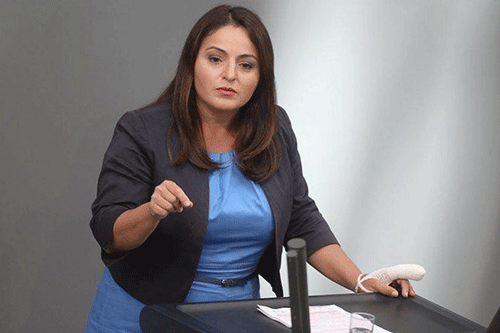The German government is not serious about genuinely atoning for its colonial crimes, Bundestag member Sevim Dağdelen has said.
She is a member of the Left Party and has been one of the lone voices in the German parliament, who have over the years advocated for justice for the descendants of the 1904-08 genocide, which colonial Germany meted out on Ovaherero and Nama communities.
She is also a staunch believer that Germany must engage the affected communities directly, instead of having talks between it and their Namibian counterparts.
In a statement availed to this paper, Dağdelen called it “a sorry state of affairs when the Federal Government refuses to this day to negotiate directly with the descendants of the victims of the genocide”.
“This obstructive stance documents once again that there is no interest on the part of the Federal Government in genuinely reckoning with Germany’s colonial crimes.”
In her latest missive, she said: “For several months now, there has been radio silence at government level in the dialogue between Germany and Namibia that aims to address colonial history. As evident from a Federal Government reply to a Minor Interpellation [from Member of the Bundestag Sevim Dağdelen group coordinator of the Left Party parliamentary group on the Committee on Foreign Affairs], no personal meetings have taken place since the end of 2022 between representatives of the German Federal Government and the Namibian Government in this context,” Dağdelen said.
When she followed up on the updates of genocide talks between the two governments, she was informed that “The Federal Government and its Namibian counterpart remain in conversation in order to clarify the outstanding questions of interpretation in the Joint Declaration initialled by both sides on 15 May 2021.”
The German government, Dağdelen has come to learn, entered into the political dialogue with the aim of reconciliation at the initiative of the Namibian Government.
For her, the response is a slap in the face for the affected communities and other restorative justice activists.
“With this, the Federal Government seeks to justify why they have still not considered granting individual compensation for descendants of the victims or a lump-sum compensation to designated representatives of victims or victim associations, which corresponds with the stated understanding of the Namibian government and its view that it involved all affected groups in the course of negotiations on the ‘Joint Declaration’.
“Since the start of the negotiations – in other words since 2015 – the German Federal Government itself has never considered seeking coordination and agreement from the Namibian government in order to broker individual compensation for descendants of the victims or a lump-sum compensation for designated representatives of victims or victim associations,” she said.
Declaration
At the end of May 2021, Germany and Namibia reached an agreement in principle on a joint declaration in which the events are described as genocide “from today’s perspective”.
In line with the agreement, €1.1 billion or N$18 billion is to be spent on reconstruction and development projects in Namibia over the next 30 years.
This is while Namibia’s N$1.1 trillion demand takes into account loss of life, dispossession of land and displacement, amongst others.
The German deal has been largely rejected by the affected communities, opposition parties in the Namibian parliament and traditional leaders.
During her visit to Namibia last year, Dağdelen was astonished by the extent to which the disputed joint declaration between Germany and Namibia was elevated here, as it reached Parliament.
Since her visit, the Namibian government has been waiting for Germany’s response to their July 2022 letter to relook the widely rejected tentative genocide agreement.
The talks have seemingly hit a cul-de-sac.
“Hopefully, we will reach a figure which Germany is ready to give, and which Namibia is ready to accept,” vice president Nangolo Mbumba, who spearheads genocide talks on behalf of government, said last year.
– emumbuu@nepc.com.na



